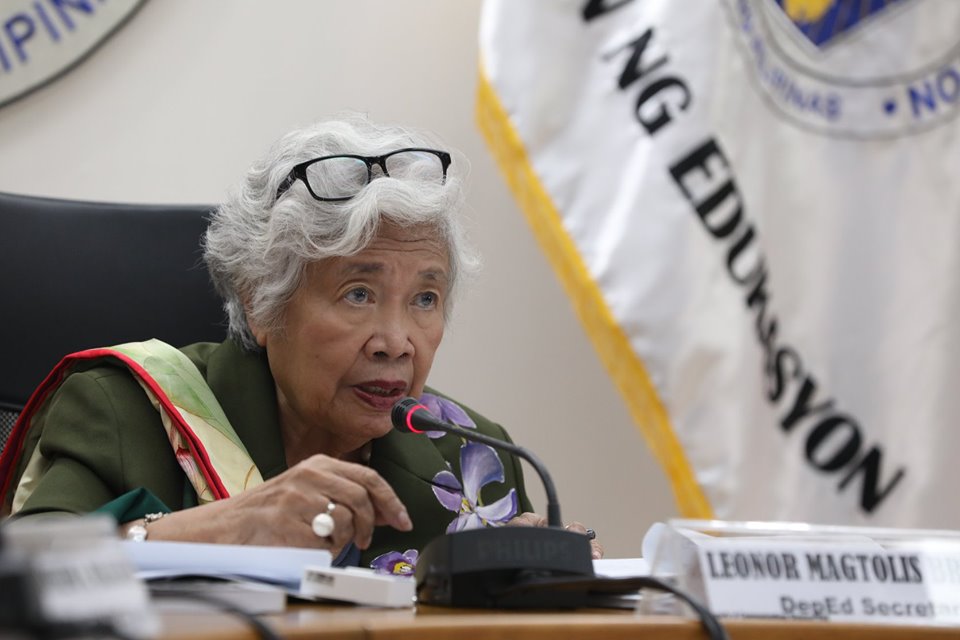
MANILA — The 55 Salugpungan Ta’ Tanu Igkanogon (Salugpungan) tribal schools in Southern Mindanao were not “closed” but only “temporarily suspended” due to their failure to comply with the requirements set down by the Department of Education (DepEd) for private schools to be given a permit to operate.
This was stressed by DepEd Secretary Leonor Briones Tuesday during the hearing of the agency’s proposed 2020 budget before the House Committee on Appropriations.
At the budget briefing, Bayan Muna party-list Rep. Eufemia Cullamat asked Briones why the 55 schools catering to indigenous people (IPs) were closed and what procedures were undertaken by the agency to justify the closure.
“I would like to clarify that the order was suspension and not closure,” Briones told the lawmakers.
As to the process concerning the suspension order, Briones said the agency has specific regulations and criteria for giving permits to private schools “which are applied to all.”
“The mandate of the DepEd is to issue a permit to operate. All elementary and high school institutions, be it IPEds (Indigenous people education program) and religious schools, they need a permit to operate,” Briones said.
She said among the requirements before a permit to operate is issued include: that the school site must be permanent and titled, schools should have facilities, teachers should be qualified, that the curriculum is consistent with the DepEd curriculum, and the school should be subject to regulation and inspection of the DepEd officials.
“The permit is given on a yearly basis and has to be renewed every year,” she said.
However, Briones pointed out that the 55 suspended Salugpungan schools did not comply with most, if not all, of the requirements.
For one, she maintained that the schools should have their own director, “unlike the 55 suspended schools that only have one director supervising a large area.”
“That is already our regulation simulat sapul pa (ever since),” Briones said.
She added that DepEd officials must also ascertain that there are actual students in the schools.
“Titignan ng mga supervisor kung yung mga learners ay di parehong learners na galing naman sa ibang school (Supervisors will see to it that that the learners are not the same learners from other schools). Each school must have its own learner,” Briones said.
“But the fact remains that many of these schools are closed precisely wala ng nag-eenrol (no one is enrolling). Napuntahan ko yan, wala nag-enroll at wala ring teacher (I went there, there are no enrollees and there are no teachers),” she said.
But the issue on Salugpungan schools was already there even before she assumed the post as Education secretary, Briones noted.
Briones said it was common practice by the said schools to negotiate for a permit even if they are not qualified, and that temporary permits were issued on the promise that the requirements would be met in the following year.
“For the past several years, we have been granting them temporary permits because of the negotiations. This should not be allowed to continue, to just keep on negotiating without complying with the requirements,” she said.
Briones clarified that the suspended Salugpungan schools are not being singled out by the government.
She said the requirements set forth by the DepEd are separate from the requirements provided by other agencies.
“We treat schools named after a saint, after a bible character or named after a former principal or a former superintendent of the local schools the same: they are subject to the same requirements,” Briones said.
As for the suspension order, Briones said assessments are still ongoing in the regional office.
“There is no decision yet. If we receive their response, then we evaluate them. And that will be the basis of the decision of the regional director under the decentralized system,” she said.
Cullamat maintained that Lumads have the right to establish and manage their own school systems based on their dialect, traditional teachings and traditional learning as per the United Nations (UN) Declaration to Rights to Education.
But Briones pointed out that the “UN also respects the laws of member-States.”
“We respect the UN, but the UN also respects the responsibility of the State to regulate these schools na pareho lang ang standards (with the same standards),” she said.
“If the curriculum is complied with, the schools are permitted to add subjects as long as we see that they comply with the requirements. They (Salugpungan) still have no DepED permits because they have yet to comply with the requirements,” Briones said.